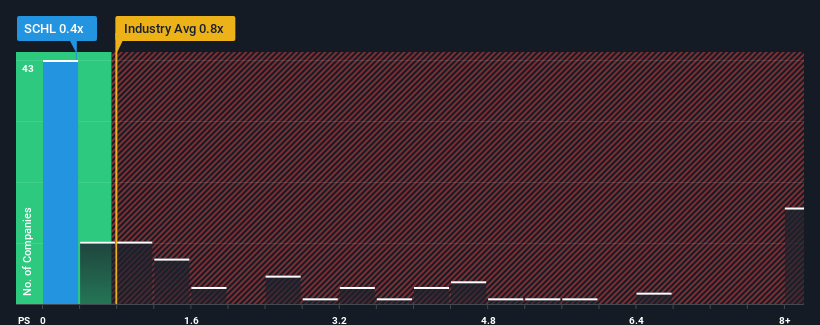- United States
- /
- Media
- /
- NasdaqGS:SCHL
Slammed 25% Scholastic Corporation (NASDAQ:SCHL) Screens Well Here But There Might Be A Catch

Scholastic Corporation (NASDAQ:SCHL) shareholders that were waiting for something to happen have been dealt a blow with a 25% share price drop in the last month. The drop over the last 30 days has capped off a tough year for shareholders, with the share price down 48% in that time.
Although its price has dipped substantially, you could still be forgiven for feeling indifferent about Scholastic's P/S ratio of 0.4x, since the median price-to-sales (or "P/S") ratio for the Media industry in the United States is also close to 0.8x. While this might not raise any eyebrows, if the P/S ratio is not justified investors could be missing out on a potential opportunity or ignoring looming disappointment.
See our latest analysis for Scholastic

How Scholastic Has Been Performing
While the industry has experienced revenue growth lately, Scholastic's revenue has gone into reverse gear, which is not great. It might be that many expect the dour revenue performance to strengthen positively, which has kept the P/S from falling. If not, then existing shareholders may be a little nervous about the viability of the share price.
If you'd like to see what analysts are forecasting going forward, you should check out our free report on Scholastic.How Is Scholastic's Revenue Growth Trending?
The only time you'd be comfortable seeing a P/S like Scholastic's is when the company's growth is tracking the industry closely.
In reviewing the last year of financials, we were disheartened to see the company's revenues fell to the tune of 3.9%. This has soured the latest three-year period, which nevertheless managed to deliver a decent 8.0% overall rise in revenue. Although it's been a bumpy ride, it's still fair to say the revenue growth recently has been mostly respectable for the company.
Shifting to the future, estimates from the sole analyst covering the company suggest revenue should grow by 7.2% over the next year. That's shaping up to be materially higher than the 4.4% growth forecast for the broader industry.
With this in consideration, we find it intriguing that Scholastic's P/S is closely matching its industry peers. It may be that most investors aren't convinced the company can achieve future growth expectations.
What Does Scholastic's P/S Mean For Investors?
Scholastic's plummeting stock price has brought its P/S back to a similar region as the rest of the industry. Typically, we'd caution against reading too much into price-to-sales ratios when settling on investment decisions, though it can reveal plenty about what other market participants think about the company.
Despite enticing revenue growth figures that outpace the industry, Scholastic's P/S isn't quite what we'd expect. Perhaps uncertainty in the revenue forecasts are what's keeping the P/S ratio consistent with the rest of the industry. This uncertainty seems to be reflected in the share price which, while stable, could be higher given the revenue forecasts.
We don't want to rain on the parade too much, but we did also find 1 warning sign for Scholastic that you need to be mindful of.
If companies with solid past earnings growth is up your alley, you may wish to see this free collection of other companies with strong earnings growth and low P/E ratios.
New: Manage All Your Stock Portfolios in One Place
We've created the ultimate portfolio companion for stock investors, and it's free.
• Connect an unlimited number of Portfolios and see your total in one currency
• Be alerted to new Warning Signs or Risks via email or mobile
• Track the Fair Value of your stocks
Have feedback on this article? Concerned about the content? Get in touch with us directly. Alternatively, email editorial-team (at) simplywallst.com.
This article by Simply Wall St is general in nature. We provide commentary based on historical data and analyst forecasts only using an unbiased methodology and our articles are not intended to be financial advice. It does not constitute a recommendation to buy or sell any stock, and does not take account of your objectives, or your financial situation. We aim to bring you long-term focused analysis driven by fundamental data. Note that our analysis may not factor in the latest price-sensitive company announcements or qualitative material. Simply Wall St has no position in any stocks mentioned.
About NasdaqGS:SCHL
Scholastic
Scholastic Corporation publishes and distributes children’s books worldwide.
Undervalued with excellent balance sheet and pays a dividend.
Similar Companies
Market Insights
Community Narratives




